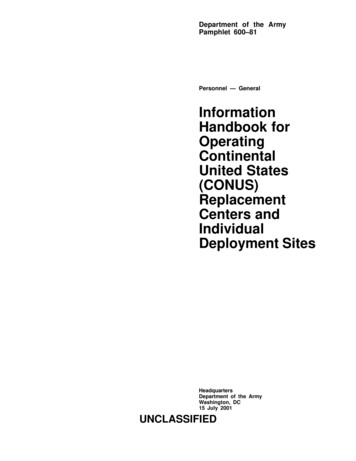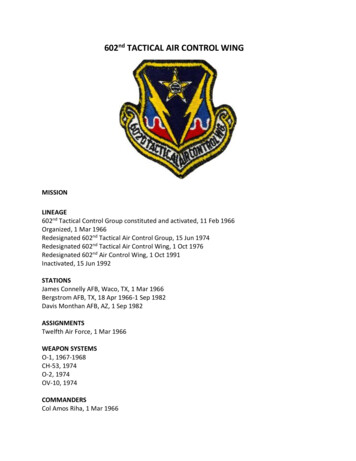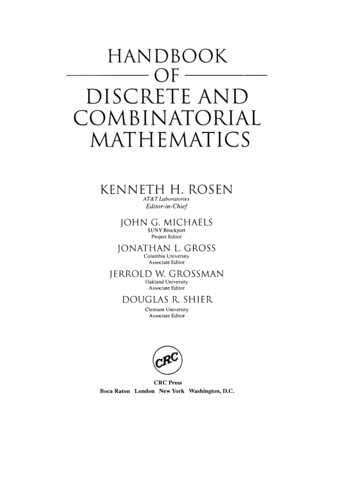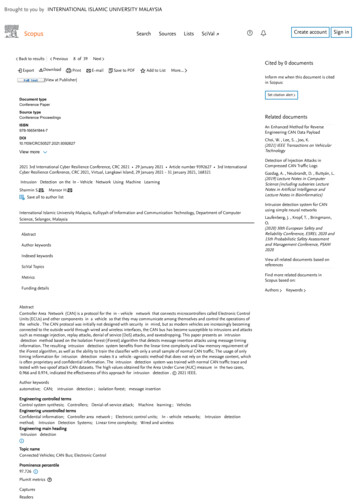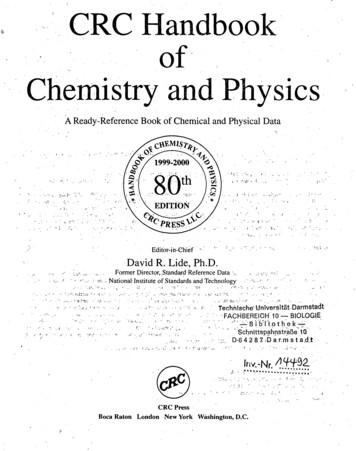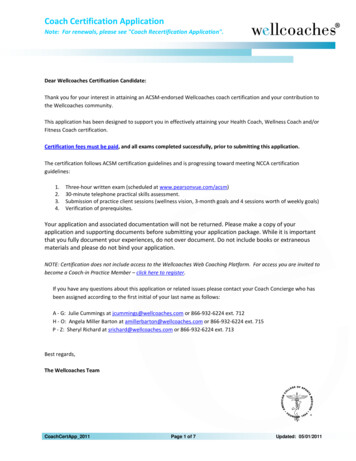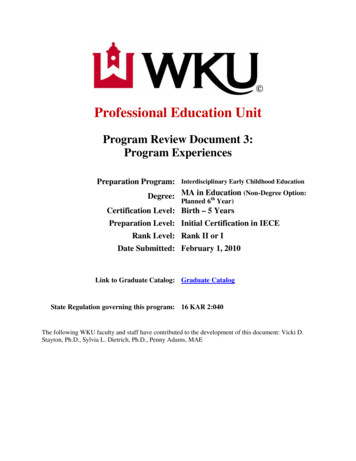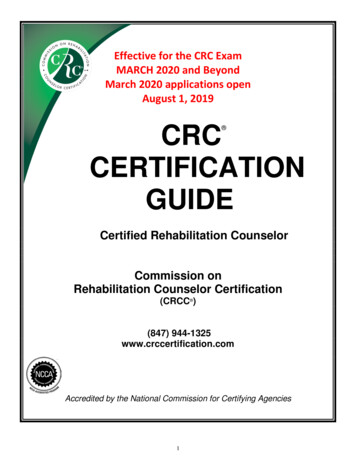
Transcription
requirementsEffective for the CRC ExamMARCH 2020 and BeyondMarch 2020 applications openAugust 1, 2019CRCCERTIFICATIONGUIDE Certified Rehabilitation CounselorCommission onRehabilitation Counselor Certification(CRCC )(847) 944-1325www.crccertification.comAccredited by the National Commission for Certifying Agencies1
CONTENTSSection 1Introduction and Inquiries3Section 2The Certification Program4Section 3The Certification Calendar5Section 4Criteria for Eligibility6Section 5Course Definitions8Section 6Acceptable Employment Experience9Section 7Application Process12Section 8Eligibility Determination12Section 9Appeals Process13Section 10The Certification Examination14Section 11Test Accommodations19Section 12Preparing for the Examination22Section 13Examination Scores, Results, Certificates, and Inquiries28Section 14Use of the CRC Designation29Section 15Certification Renewal29Section 16Fees312
SECTION 1: INTRODUCTION AND INQUIRIESThank you for your interest in the Certified Rehabilitation Counselor certification process. The acronymCRC is used throughout this guide to refer to the designation Certified Rehabilitation Counselor. CRCC is used to refer to the Commission on Rehabilitation Counselor Certification. If you pursue certification,please refer to this guide as it contains information to help you through the application and examinationprocesses. As information in this guide is updated periodically, we suggest you access the guide from ourwebsite to make certain you have the most recent edition. Please be sure to read carefully beforecompleting an application.CRCC uses email and first-class mail to maintain contact with all applicants.responsibility to update his/her contact information, making any changes necessary.It is the applicant’sInquiries: If you have additional inquiries, please contact Commission on Rehabilitation CounselorCertification.Phone: (847) 944-1325Email: applications@crccertification.comReproduction of this guide, in whole or in part, is expressly prohibited without written consent from CRCC.Recommended citation:Commission on Rehabilitation Counselor Certification. (2019). CRC Certification Guide. Schaumburg, IL:Author.CRCC is a registered service mark of the Commission on Rehabilitation Counselor Certification.All rights reserved.CRC is a registered certification mark of the Commission on Rehabilitation Counselor Certification.All rights reserved.The CRC certification mark must be used consistent with the scope for which the certification was grantedand in accordance with all applicable use policies of CRCC. Unauthorized, fraudulent or misleading use ofthe CRCC or CRC marks may result in legal or other actions, which may include but are not limited to,revocation of CRC certification.PUBLICATION DATE:REVISED:April 1981June 19, 20193
SECTION 2: THE CERTIFICATION PROGRAMThe purpose of certification is to assist in the assurance that professionals engaged in rehabilitationcounseling meet acceptable standards of quality in practice. The existence of acceptable standards isconsidered to be in the best interest of consumers of rehabilitation counseling services and the generalpublic. Through participation in both the certification and certification renewal programs, rehabilitationcounselors are also able to bring about a higher level of performance and qualification throughout theprofession.The certification program is an outgrowth of the professional concerns of two organizations: The AmericanRehabilitation Counseling Association (ARCA) and the National Rehabilitation Counseling Association(NRCA). These organizations deemed it desirable to establish standards for the profession ofrehabilitation counseling in order to enhance the quality of service delivery to persons with disabilities.These two associations created a Joint Committee on Rehabilitation Counselor Certification, which waschartered as a nonprofit organization in 1974 and renamed the Commission on Rehabilitation CounselorCertification (CRCC).Persons who earn the designation of Certified Rehabilitation Counselor (CRC) have demonstrated theypossess at least an acceptable minimum of knowledge (as determined by CRCC) with regard to thepractice of their profession. The initial certification is valid for five years. It is achieved by satisfyingspecific educational/employment requirements and then passing the CRC examination. The examinationis based on a body of knowledge that encompasses laws, public regulations, and the delivery ofrehabilitation services as practiced in the United States. CRCC conducts a role and function study of therehabilitation counseling field approximately every five years; the results of this study are used to updatethe examination and ensure other elements of the CRC certification process accurately reflect the practiceof rehabilitation counseling.CRCC requires individuals who are applying for or renewing the certification to respond to questionsrelated to any adverse actions taken by a licensing or certifying entity, reprimand or discharge by anemployer for dishonesty, and convictions for violating any laws, statutes, or ordinances. This information isused to ascertain whether such prior history provides sufficient reason to preclude the individual fromcertification. It is not CRCC’s intent to imply that any individual is suitable for employment or to imposestaffing requirements on any agency. The intent is to establish a nationwide measure of professionalstandards that may be used by any interested parties with regard to rehabilitation counseling. Employersand consumers should not rely solely on CRC certification as a basis for employing or selecting arehabilitation counselor.Rehabilitation counseling is a dynamic profession that is constantly evolving. Therefore, CRCC has acertification renewal program under which designation holders are required to demonstrate their continuingprofessional development. Certification renewal, required at five-year intervals, is considered an essentialpart of an effective credentialing process, and is intended to help practitioners keep abreast of currenttrends and new technologies, and to enhance critical skills.Acknowledging the evolving state of rehabilitation counseling, CRCC encourages CRCs to continuouslybuild on the demonstrated specified levels of knowledge, skills, and ability addressed by theeducation/employment requirements and the initial certification examination. CRCs are also required toprovide evidence of continuing competence through the completion of courses and other activities that willhelp them more effectively serve their clients.4
SECTION 3: THE CERTIFICATION CALENDARThe CRC examination is administered three times a year. This calendar provides important dates for thecertification program.Application DeadlineTesting DatesMailing of Examination Results PacketNovember 30, 2019March 6-14, 2020April 16, 2020March 31, 2020July 10-18, 2020August 27, 2020June 30, 2020October 2-10, 2020November 18, 2020A score report indicating a pass or fail status is provided to applicants at the test site following completionof the CRC examination. CRCC will mail a full examination results packet in accordance with the schedulenoted above.SECTION 4: CRITERIA FOR ELIGIBILITYCRCC does not condone or engage in discrimination based on age, arrest record (including expungedcriminal history), citizenship, color, disability (mental or physical), ethnicity/ancestry, genetic information,language (if unrelated to their duties), marital status, military status (including unfavorable discharge),national origin, pregnancy, race, religion, sex/gender, sexual orientation (including gender identity), or anyother additional class protected by applicable law, including applicable County or City ordinances.CRCC respects the privacy of its applicants. The CRCC Privacy Policy is available on CRCC’s website atwww.crccertification.com/privacy-policy.CRC eligibility is determined by CRCC after its review of an application for the CRC credential. Asdescribed in Section 2, CRCC requires individuals to respond to various questions relating to character andviolations of the law. A prior conviction for violating any law, statute, or ordinance will not automaticallypreclude an individual from being determined eligible to seek certification. However, CRCC will deem anindividual to be ineligible to seek certification if he/she has not completed parole, probation, or any otherterms or conditions imposed by any court in conjunction with a conviction, a suspended imposition of asentence, or other sentencing alternative. Convictions include guilty pleas and pleas of “no contest.”To be eligible to sit for the CRC examination, an applicant must be deemed fit to pursue CRC certificationby CRCC and must meet EVERY requirement in ONE of the categories that follow.ALL education and employment requirements must be fully satisfied by the application deadline. Thoseapplications that do not meet the eligibility criteria for ONE of the following categories upon submission ofan application will be automatically denied. At the time the applicant exhausts the appeal option orsignifies that he/she does not wish to appeal, a refund of 100 will be issued. Individuals who exhaust ordo not exercise the appeal option and who choose to continue to seek certification will be required to reapply, meet the criteria in effect at the time of re-application and pay the required certification fee.Category 1 – Student in or Graduate of an Accredited ProgramStudent in or Graduate of a master’s level rehabilitation counseling (RC) or clinical rehabilitation counseling (CLRC)program accredited by CACREP. If graduation occurred prior to July 1, 2017, the program must have beenaccredited by CORE.Additional Requirements: Students and graduates must submit evidence of an internship of 600 clock hours supervised by an on-siteCRC or by a faculty member who is a CRC. The internship must have been in rehabilitation counseling andthe intern must have a minimum of 240 clock hours providing direct rehabilitation counseling services toindividuals with disabilities. Students must have completed 75% of the course work toward the master’s degree by February 1 (for the5
March test), June 1 (for the July test), or September 1 (for the October test) in order to be deemed eligibleto take the CRC exam. Students must graduate within 12 months of their examination date and must submit their officialtranscript reflecting the granting of the degree and successful completion of the internship. Those whoachieved a passing score on the exam will be eligible to use the CRC designation only after the applicant’sreceipt of the official CRC certificate.Category 2 – Student in or Graduate of a Non-Accredited ProgramStudent in or Graduate of a master’s level rehabilitation counseling (RC) or clinical rehabilitation counseling (CLRC)program that is not or was not accredited by CACREP or CORE at the time the degree is or was conferred.Additional Requirements for the Degree Program: The degree must have been granted by a college or university accredited by a national or regionalaccrediting body accredited by CHEA at the time the degree is/was conferred. The degree program must be a minimum of 48 semester credit hours or 72 quarter hours. The degree program must require the following graduate-level courses as defined by CRCC*:o Professional Orientation & Ethics in Rehabilitation Counselingo Medical & Psychosocial Aspects of Disabilitieso Assessmento Career Development Theories & Job Development and Placement Techniqueso Case Management & Community Partnershipso Theories & Techniques of Counselingo Research, Methodology, & Performance ManagementNote: A single course may not be used to demonstrate completion of more than one of the seven knowledge areas noted above.Further, no more than two courses may be used to demonstrate completion of a single knowledge area.Although specific courses are not required, CRCC recommends programs provide coverage of content addressing social andcultural diversity; healthcare systems and services; disability management; crisis and trauma counseling; family counseling; andgroup counseling. The degree program must require the following experiential components:o Practicum of a minimum of 100 clock hours over a full academic term supervised by a facultymember who is a CRC. The student must have a minimum of 40 clock hours providing directrehabilitation counseling services to individuals with disabilities.o Internship of 600 clock hours supervised by an on-site CRC or by a faculty member who is aCRC. The internship must have been in rehabilitation counseling and the intern must have aminimum of 240 clock hours providing direct rehabilitation counseling services to individuals withdisabilities.Additional Requirements for Students: Students must have completed 75% of the course work toward the master’s degree by February 1 (for theMarch test), June 1 (for the July test), or September 1 (for the October test) in order to be deemed eligibleto take the CRC exam. Students must graduate within 12 months of their examination date and must submit their officialtranscript reflecting the granting of the degree and successful completion of the internship. Those whoachieved a passing score on the exam will be eligible to use the CRC designation only after the applicant’sreceipt of the official CRC certificate6
Category 3 – Graduate of a Master’s or Doctoral Program in Related Field of StudyGraduate of a master’s or doctoral program in a related field of study with course content that emphasizesrehabilitation, counseling, disability, therapy, health, employment, wellness, or human development.Examples of acceptable degrees include, but are not necessarily limited to:Human ResourcesHuman ServicesMarriage and Family TherapyMental Health CounselingOccupational TherapyPhysical TherapyPsychologyRehabilitation ServicesSchool CounselingSchool PsychologySocial WorkSpecial EducationSubstance Use Disorders CounselingVision Rehabilitation StudiesVocational AssessmentVocational EvaluationAddictions CounselingBehavioral HealthBehavioral ScienceBlindness RehabilitationChild/Family StudiesCommunication DisordersCounselingCounseling PsychologyDeaf EducationDisability StudiesEducational PsychologyGuidance and CounselingHealth ServicesHealth StudiesHuman DevelopmentHuman RelationsAdditional Requirements for the Degree Program: The degree must have been granted by a college or university accredited by a national or regionalaccrediting body accredited by CHEA at the time the degree is/was conferred.Additional Requirements for Graduates: Graduates must submit evidence of having taken or taught each of the following courses where thecourse objectives reflect content defined by CRCC (see Section 5: Course Descriptions).o Professional Orientation & Ethics in Rehabilitation Counselingo Medical & Psychosocial Aspects of Disabilitieso Assessmento Career Development Theories & Job Development and Placement Techniqueso Case Management & Community Partnershipso Theories & Techniques of Counselingo Research, Methodology, & Performance ManagementNote: A single course may not be used to demonstrate completion of more than one of the seven knowledge areas notedabove. Further, no more than two courses may be used to demonstrate completion of a single knowledge area.Although specific courses are not required, CRCC recommends graduates seek coverage of content addressing socialand cultural diversity; healthcare systems and services; disability management; crisis and trauma counseling; familycounseling; and group counseling. Graduates must submit evidence of one of the following experiential requirements:oA graduate-level internship of 600 clock hours supervised by an on-site CRC or by a facultymember who is a CRC. The internship must have been in rehabilitation counseling and theintern must have a minimum of 240 clock hours providing direct rehabilitation counselingservices to individuals with disabilities. Graduate credit must be awarded and must appear onan official transcript.oTwelve (12) months of acceptable work experience* under the supervision of a CRC.oTwenty-four (24) months of acceptable work experience*.7
oTwenty-four (24) months of full-time employment teaching in a rehabilitation counseling (RC) orclinical rehabilitation counseling (CLRC) program subsequent to earning the master’s or doctoraldegree. Full-time employment is defined as 6 semesters, 8 quarters, or 2 contractual periods of12 months and must include the supervision of students and/or direct clinical work with apopulation of individuals with disabilities.*(See Section 6 for definition of acceptable employment experience)Earned Degree RequirementsTo verify your educational background, CRCC requires an official transcript that shows the granting ofyour degree. A transcript will be considered official only if it bears the seal of the college or universityand the signature of the school’s registrar. If your degree was granted under a name other than the onethat appears on your certification application, the institution should be asked to include your presentname with the transcript.If you are an applicant under Category 1, CRCC does not require you to submit your official transcriptuntil your degree has been granted.For a degree to meet the educational requirements for certification eligibility, the granting college oruniversity must have been accredited at the time the degree was conferred by one of the national orregional accrediting associations accredited by the Council on Higher Education Accreditation (CHEA).However, if your degree is from a foreign country, CRCC will allow individuals to submit their transcriptsalong with an evaluation report from either of the following sources:American Association of Collegiate Registrars and Admission Officers (AACRAO)/Office ofInternational Education Services, www.aacrao.org/international, (202) 296-3359.World Education Services (WES)/International Academic Credential Evaluation, www.wes.org, (212)966-6311.CRCC will not accept evaluations completed by other sources. The evaluation report must be sent fromthe source directly to CRCC postmarked by the application deadline date and must include recognitionstatus of foreign institution, level of education completed by student, U.S. degree comparability, field ofstudy, courses, credits or units, individual grades or overall grade average, and course content. Theapplicant is responsible for all fees associated with the evaluations and it is the applicant’s responsibilityto ensure the evaluations reach CRCC by the deadline date. CRCC will evaluate the courses, units,and/or degrees on a course-by-course basis.SECTION 5: COURSE DEFINITIONSIf you are applying in Category 2 or 3, you must document specific course work at the graduate or postgraduate level to satisfy the educational requirements these categories.A single course may not be used to demonstrate completion of more than one of the seven requiredknowledge areas noted below. Further, no more than two courses may be used to demonstratecompletion of a single knowledge area.-8-
CRCC defines the required courses/knowledge areas as follows:Professional Orientation & Ethics in Rehabilitation Counseling focuses on the history andphilosophy of rehabilitation counseling, noting federal legislation concerning vocational rehabilitation andindependent living mandates. Content must also focus on ethical issues in rehabilitation counseling.Further, rehabilitation counseling services provided in various settings and career options forrehabilitation counselors must also be explored.Medical & Psychosocial Aspects of Disabilities focuses on the medical aspects of a variety ofdisabilities, medical terminology, and functional implications of a variety of disabling conditions, as wellas the psychological and social implications of a variety of disabilities on individuals with disabilities,family members, other individuals, and society. The nature of disability and related functionalimplications explored may include but are not limited to: a) cognitive; b) hearing; c) orthopedic orphysical; and d) visual.Assessment focuses on individual appraisal and standardized testing. Content must encompass theuse of standardized tests in areas such as achievement, aptitude, interests, personality, situationaltesting, behavior observation. Further, content must include instruction in the interpretation andapplication of assessment data.Career Development Theories & Job Development and Placement Techniques focuses on careereducation, career development, career exploration, and job placement. Further, content must includecareer development theories (e.g., Holland, Super, Roe, Minnesota Theory of Work Adjustment, etc.);the use of occupational information and labor market trends in career counseling; and job developmentand placement strategies, including placement of personnel, special populations, and employerconsiderations.Case Management & Community Partnerships focuses on the applied principles of case and caseloadmanagement; delivery systems that encompass public, private for-profit, and private not-for-profitsettings; and community partnerships, including educational and vocational programs and assistivetechnology solutions, offered in diverse settings to a variety of populations with disabilities.Theories & Techniques of Counseling focuses on the study and application of a broad range ofcounseling theories and techniques. Acceptable theories include but are not limited to: a) cognitive[reality, cognitive-behavioral, cognitive-processing, rational-emotive, Gestalt]; b) behavioral; c)psychoanalytic; d) client-centered; e) narrative; f) feminist; g) solution-focused; and h) systems theories.Research, Methodology, & Performance Management focuses on systematic investigation,procedures and/or approaches in research, including collecting and analyzing data using a variety ofresearch designs. Content must also focus on the use of research in evidence-based practices andperformance management, including program evaluation, quality assurance, and continuousimprovement, in order to demonstrate effectiveness of rehabilitation counseling programs and services.Further, content must also provide an orientation to test and measurement principles such as norms,reliability, and validity.SECTION 6: ACCEPTABLE EMPLOYMENT EXPERIENCECRCC will accept full-time paid employment (or its equivalent in part-time work) and as a valid fulfillmentof the experience criteria. All part-time employment will be pro-rated based on a 35-hour work week.For any employment to qualify as acceptable, the required employment verification form must provideevidence that 100% of your time (at each position) has been spent working as a counselor in a settingthat provides rehabilitation counseling services to individuals with disabilities as defined by CRCC. All-9-
claims of employment must be verified by your current and former employers/supervisors. Employersand/or supervisors must have been directly involved with overseeing the professional work experience ofthe applicant. Furthermore, at least 50% of your activities must involve providing the DIRECTrehabilitation counseling services listed in this section. The term “individuals with disabilities” isinterpreted by CRCC to include persons who have limitations in life functioning (e.g., school, work,independent living, mobility) as a result of conditions such as sensory impairments, mental illnesses,developmental disabilities, learning disabilities, neurological disorders, chemical dependencies, and/orphysical disabilities. Each claim of employment must reflect professional experience as defined in AreasI and II which follow. Your employment verifications must include evidence of job activities in both areas.The minimum percentage of time allotted to each area must be at least 10%, while the combined timespent on both must be no less than 50%.AREA I. Counseling.The application of cognitive, affective, behavioral, and systemic counseling strategies that includedevelopmental, wellness, and multicultural principles of human behavior. Such interventions arespecifically implemented in the context of a professional counseling relationship and may include, but arenot limited to: vocational, individual, group, marriage, and family counseling and psychotherapy; thediagnostic assessment and treatment of persons with mental, emotional, and behavioral impairments ordisabilities; guidance and consulting to facilitate educational and career development; the utilization offunctional assessments and career counseling for persons requesting assistance in adjusting to adisability assessment; referrals; consulting; and research.AREA II. Planning and delivery of rehabilitation counseling services for individuals withdisabilities as shown below. Your employment must reflect sufficient activity in at least three (3)of the seven areas, ONE of which must be either a) case management, b) client assessment, c)service planning for individuals with disabilities, or d) rehabilitation services coordination.a) Case management: This is the process of analyzing, planning, supervising, and administering thesequential flow of rehabilitation services to the clients for whom the counselor has responsibility aswell as coordinating the services of other professionals and resources as required.b) Client assessment: Assessment is the process of collecting in-depth information about a client’ssituation and functioning, to include information pertaining to vocational, medical, psychological,social, functional, and environmental factors, in order to identify the client’s needs and develop acomprehensive rehabilitation plan that will address those needs. The continual assessment andsynthesizing of this information are the basis of a plan for rehabilitation services.c) Service planning for individuals with disabilities: Service planning is the process of determiningspecific objectives, goals, and actions designed to meet the client's needs as identified throughassessment results. The plan that is developed should be measurable, action-oriented and timespecific.d) Rehabilitation services coordination: The counselor uses client assessment information tocoordinate required rehabilitation services. The assessment results are used to determine the need forspecific services and to make referrals to appropriate providers. Other activities involve assessing theclient’s progress toward rehabilitation goals, determining the financial resources/obligations related to therequired services, and providing feedback to all appropriate parties.e) Job analysis: Job analysis provides systematic and detailed information about a job: what theworker does in relation to data, people, and things; the environmental and physical demands of thejob; the methodology and techniques employed; the machines, tools, equipment, and work aids used;the materials, products, subject matter or services that result; and the traits required of the worker.f) Job development/placement: Job development refers to the process of consultation withemployers and the development of job opportunities in a comprehensive, professional manner. The- 10 -
intent is to establish continuing and mutually beneficial relationships with potential employers throughselective placement, job modification, and adjustment counseling. Job development activities shouldprovide clients with an opportunity to reach their employment potential. Job placement refers to theprofessional activities involved in assisting persons with disabilities to seek, obtain, and maintainappropriate employment. It may include guidance in vocational decision-making; training in jobseeking skills; supportive counseling; identifying job leads; conducting labor market surveys;negotiating with employers, supervisors and co-workers; and providing post-employment and followup services.g) Advocacy: The process of working to reduce attitudinal and environmental barriers in society andfacilitating the full inclusion of individuals with disabilities in their communities. The process mayinclude advocacy on the individual or systems levels, benefits counseling, or supporting selfadvocacy efforts of individuals with disabilities.For employment to be considered for an eligibility review, each position must be verified on theEmployment Verification Form. This form must be completed and signed by the appropriatesupervisor/employer. It is the applicant’s responsibility to ensure that all required documentation issubmitted to CRCC as part of the completed application. Applications missing any requireddocumentation will not be considered for eligibility.The flowchart on the following page provides an overview of the process for determining employmentacceptability.- 11 -
SECTION 7: APPLICATION PROCESSApplications for the March 2020 examination will open on August 1, 2019.CRCC will provide step-by-step instructions for completing the application process.SECTION 8: ELIGIBILITY DETERMINATIONAn applicant who does not meet the CRCC eligibility requirements will receive a notification explainingthe reason and a notice of their right to appeal. CRCC’s Executive Director will review the appeal andmay send the appeal to CRCC’s Standards and Examination Committee. If the Standards andExamination Committee recommends denying the appeal, the CRCC Executive Committee will make thefinal decision regarding the applicant’s eligibility.Materials submitted by the applicant, including as any new evidence the applicant wishes to submit, willbe considered during the appeal process.Although not an all-inclusive list, the following may constitute grounds for immediate discontinuation ofapplication processing or, if the individual becomes certified, revocation of an individual’s certification: Falsification of the certification application. Falsification of t
Effective for the CRC Exam MARCH 2020 and Beyond March 2020 applications open August 1, 2019 CRC CERTIFICATION GUIDE Certified Rehabilitation Counselor Commission on Rehabilitation Counselor Certification (CRCC ) (847) 944-1325 www.crccertification.com Accredited by the National Commission for Certifying Agencies
